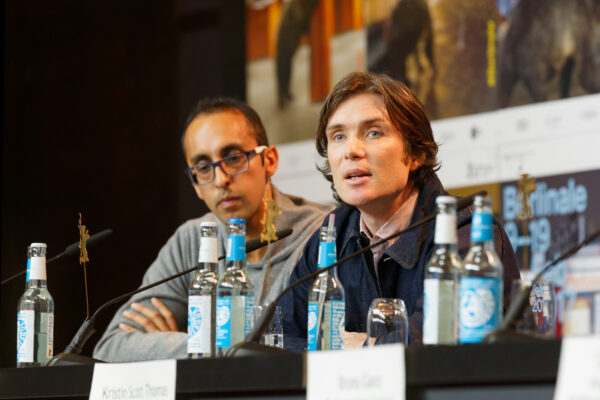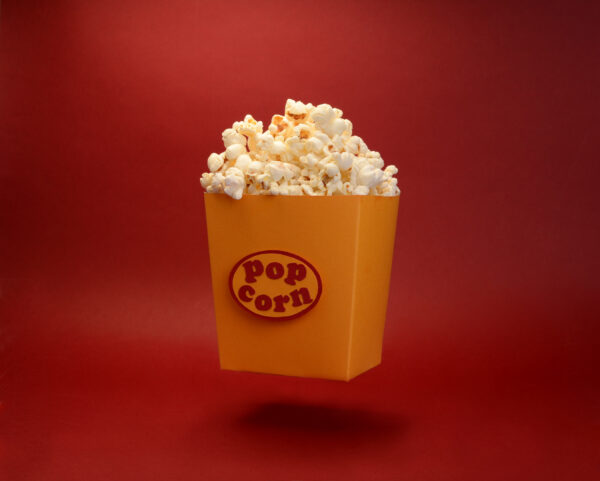The double-bill phenomenon makes history after breaking Irish box-office records
By Brian Bowe
What started out as a harmless meme became a multimillion cinematic event. It inspired much debate, cosplay fun, and countless think pieces untangling and dissecting its ramifications. It also inspired the Irish Film Institute to start selling popcorn, an historic decision which has attracted an equal amount of praise and criticism among Dublin’s cinemagoers.
In case you’ve spent the summer living under a rock – which, considering the high cost of rent these days looks as tempting as ever – Barbenheimer is a clunky and cute portmanteau of Barbie and Oppenhiemer, two films which were released simultaneously on July 21st. The build-up was intense; Barbie’s marketing team flooded social media with everything imaginable, from kooky memes to AirBnb tie-ins. There was also a Barbie-themed boat cruise! Oppenhimer, the more old-fashioned of the two, relied more on buzzy trailers and press junket clips.
More interesting, though, was how the public responded. The film’s directors, Oppenhimer’s Christopher Nolan and Barbie’s Greta Gerwig both had very passionate and very online fans eager to join in on the fun. What made this stand-off particularly captivating was how different these fan bases were. A playful meme-competition ensued with members from each side one-upping the other, providing neutrals with endless amounts of content to chuckle at.

For weeks (if not months) leading up to the double release date, awareness could not be higher and the conversation couldn’t be louder. Barbenheimer fever had taken hold! the only cure: buy a ticket for both. On July 21st, the deranged double-bill that was Barbenheimer delivered big. The queues winding outside theatres were as long as I’d ever seen. Lobbies were flooded with pink outfits, some (mostly insecure men) even cosplayed as Ryan Gosling’s character from Drive — A for effort! The Lighthouse cinema was giving out Barbenheimer-themed buttons, while the IFI offered a celluloid frame from Oppenhiemer for the first 100 people in the queue.
The result: big money. Many thought Barbie would perform well — it has stars, a respected director, and is based on a cross-generational iconic toy — but I don’t think anyone expected what happened. Barbie became a cultural watershed event, overtaking Super Mario Bros Movie’s total to become the year’s biggest box office hit. Now that the film recently moved to digital platforms, it’s sure to score more milestones.

Oppenheimer proved no slouch either, finding itself the third biggest earner of the year. The film even overtook Nolan’s Inception from 2010, cementing itself as the filmmaker’s third-biggest release of all time, behind his second and third Batman films. Few thought the three-hour-long unconventional biopic on the life of theoretical physicist J. Robert Oppenheimer would do gangbusters — out-performing this year’s superhero movies, no less — but it’s safe to say that the Barbenheimer hype machine, instead of pitting the two films against each other, was a tide that rose all ships.
Closer to home, there seemed to be a pinch of healthy competition even among Dublin’s arthouse cinemas. The Lighthouse Cinema went all out for Barbie, decking out their floors with pink bunting as far as the eye could see. The Irish Film Institute (IFI), on the other hand, seemed firmly in the Oppenhiemer camp, screening Nolan’s film across three formats: on luminous 70mm, 35mm, and Digital.

That the IFI were screening Barbie, at all, came as a surprise. But a bigger surprise, still, came when the Temple Bar cinema announced that they’d be selling popcorn for the first time ever. The news sent shockwaves across social media; seeing IFI even being mentioned on TikTok was quite surreal. Some were delighted while others cried “betrayal!” One Facebook user commented, “Unnecessary, one of the best things about the IFI was no smell of popcorn and sticky, sugary drinks.” The IFI’s response to all the belly-aching underlined the necessity of such a strategy: “in order to uphold our unique activity and programming of independent and Irish film, we must remain commercially viable.”
It all paid off in the end. On August 25th, the IFI announced that Christopher Nolan’s biographical epic became their highest grossing film ever, overtaking the much-beloved An Cailín Ciúin. Speaking about this phenomenal milestone, IFI Cinema Programmer Kevin Coyne said, “The success of Christopher Nolan’s Oppenheimer at the IFI is a tribute to the director’s ability to create mature, thought-provoking films that are best enjoyed and appreciated on the big screen, with an audience of fellow film fans. We are particularly pleased to be able to present the work of someone who is such an advocate for the cinema experience on this magnificent 70mm format, as he prefers.”
While at Smithfield’s Lighthouse Cinema Barbie came out on top, rising above 2019’s Parasite to be named the theatre’s most popular film of all time. Speaking to Dublin People about the Barbenheimer phenomenon, Alice Black, Head of Film Programming at Lighthouse, said “the sense of occasion was palpable in both our cinemas (Lighthouse and Galway’s Pálás cinema) this weekend. This weekend reminded everyone of the pure joy of going to the movies. Whether it was staying up past midnight to see the first 35mm Oppenheimer or getting up at 8am for a Barbie breakfast or digging something pink out of the back of the closet, our customers and staff embraced these two films with gusto.”
Barbenheimer helped cinemas to bounce back big after the pandemic dented earnings for a considerable time. However, with Hollywood’s current SAG-AFTRA strike disrupting movie production, for who knows how long, as workers battle over pay and AI in the streaming era, cinemas will most likely see a dip in revenue. Unfortunately, cinemas are expected to experience a decline in revenue as a result. Additionally, several highly anticipated films like Dune: Part II, Kraven the Hunter, and the sequel to Ghostbusters: Afterlife have been postponed until 2024 due to the strike, as actors are unable to promote studio movies during this time.
Despite the challenges currently facing the cinema industry, the success of Barbenheimer at the box office provides some hope for its future. The overwhelming response and giddy enthusiasm from audiences show that the magic of big screen event cinema programming is still cherished. While the SAG-AFTRA strike may bring some short-term setbacks, the resilience and creativity of the film industry have proven time and again that it can adapt and overcome any obstacle.



